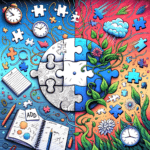ADHD (attention deficit hyperactivity disorder) might impair your capacity to reason. In reality, ADHD can often leave you feeling like you have a fog in your head. Your response time becomes slower. It might be more difficult to retain information, analyze your ideas, and find the correct words to express yourself.
This article discusses the connection between ADHD and the disorder referred to as brain fog. It addresses remedies that may help remove the moisture and highlights which ADHD can impair mental abilities.
What exactly is ADHD Brain Fog?
ADHD brain fog, like all forms of brain fog, is a time of muddled thinking. The individual is frequently irritated by their capacity to think, which leads to disarray and unrest; it appears that doing anything is preferable to doing nothing. People suffering from ADHD brain fog report feeling distracted and mentally tired.
Anxiety, melancholy, reduced performance, forgetfulness, and communication difficulties can all result from brain fog. When these circumstances come together, it is nearly complicated for the individual to operate regularly.
The following symptoms are associated with brain fog:
- Mental exhaustion
- Forgetfulness
- Inability to focus on what you’re doing or happening around you.
- physical activity
- Finding it difficult to express yourself
- Incoherent or chaotic ideas that are difficult to understand
- Careless
Brain fog comes in waves, but when it does, it can exacerbate other symptoms, particularly executive maladaptive behaviors like uncertainty or lack of attention. It’s challenging to finish a work when you can hardly sound right of your ideas and experience that your body and brain are operating in slow motion.
Sometimes your brain may be simply unavailable. Someone will speak to you, but your mind will not absorb and understand the words even if they use the same dialect as you. It’s nothing more than a collection of noises. Similarly, when you attempt to read, the letters on the page make no sense. You read the exact words repeatedly, yet nothing is sent to your brain.
Is it possible for ADHD to create brain fog?
According to research, aging, severe brain traumas, central nervous system injuries, and even dehydration and standing for too long have all been linked to it. Lupus, autoimmune diseases, chronic fatigue, and COVID-19 are all illnesses that can induce transient mental sluggishness.
People with ADHD might also suffer from a mental fog. Here’s what the study says about the link between ADHD and foggy thinking.
What Triggers ADHD Brain Fog?
Brain fog can be a symptom of various underlying health issues that affect people regardless of whether they have ADHD. However, ADHD can produce periods of mental fog. Furthermore, having ADHD might make it more challenging to maintain a healthy and balanced lifestyle that would prevent your brain from fogging.
Dopaminergic System Dysfunction
The dopaminergic system is a central nervous system that regulates cognition, executive functions, desire, and other activities. When that system malfunctions, it can cause executive dysfunction, impaired cognition, and memory issues.
This is one cause why having ADHD may make you more prone to brain fog.
Inflammation of the Brain
Some studies suggest that brain inflammation contributes to brain fog since an accumulation of inflammatory chemicals might impede or shut down cognitive functioning.
According to one comprehensive review of research, persistent, reduced inflammation in the injury induced by an overactive or deficient inflammatory response corresponds with the formation of ADHD.
So, since persons with ADHD are more prone to systemic inflammation, anything that causes even more inflammation might exacerbate your ADHD symptoms to the point of brain fog.
Lack of Physical Activity
Physical activity boosts blood flow to the brain and oxygen levels in the brain, increasing neurotransmitters and endocannabinoid receptors, which can improve cognitive skills such as attention, memory, and executive functions.
As a result, not getting enough exercise can deplete the brain of these critical benefits. Lack of physical activity can contribute to cognitive deterioration over time, leaving you more susceptible towards brain fog when you grow.
Inactivity may also raise your chances of developing persistent low-grade inflammation. While inflammation increases immediately after an intensive workout, studies suggest that persons who exercise consistently have better anti-inflammatory reactions and lower overall degrees of inflammation in the long run.
A lack of iron
It may be worth contacting your healthcare practitioner to check your iron levels if you menstruate and have ADHD. According to one 2021 study, approximately 12% to 18% of the usually healthy and athletic women in the sample were iron deficient, which can produce brain fog.
If you menstruate and notice that your brain fog usually begins (or worsens) during your period, consider being tested for iron deficiency.
How to Deal with ADHD Brain Fog
A variety of techniques can be used to address ADHD brain fog. It is critical to seek aid from friends and family to deal with the situation. They would be able to motivate and assist you, and they might also detect any problems. You may take some basic measures to enhance your thinking and regain your attention.
Obtain Help
If you believe you are suffering from ADHD brain fog, the first step is to speak about it. Discussing what is going on will provide assistance and support from others around you, allowing you to get back on track.
Get more rest
ADHD mental fog might develop more quickly if you don’t get enough sleep. Sleep is essential for restoring your health after a hard day, so aim for 7-8 hours of rest each night.
Regular exercise is essential
ADHD brain fog can cause us to feel tired and agitated. Regular exercise will give you more energy, reduce stress, and enhance your attention. Training can also improve your sleep, increasing your awareness and clarity.
Maintain a healthy diet
ADHD cognitive fog is likely to be exacerbated by a poor diet. Junk food, sugary treats, and processed meals are detrimental to attention and focus; instead, consume various fresh vegetables, fruits, lean meat, and fish.
Enhance your routine
If you have ADHD, poor organization will likely contribute to developing ADHD brain fog. To address this, attempt to organize your day ahead of time and be as regular as necessary with any daily chores or practices you follow.
Use calendars and alarm clocks to assist you in remembering commitments and keeping track of your daily duties. It might also be beneficial to use apps to remind oneself of future occasions.
The takeaway
To combat ADHD brain fog, focus on your diet, exercise routine, and stress management. Use the aid of others to improve your confidence and motivate you to achieve your goals. If the sensations continue to overwhelm you, meditation could be able to assist recover your cognitive energy levels.
A healthy supplement will give your brain the necessary boost to increase your attention and minimize your symptoms, allowing you to leave ADHD brain fog beyond you.




